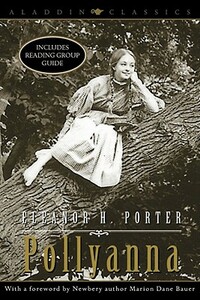Take a photo of a barcode or cover
Absolutely delightful read... filled with wisdom from a little girl's point of view... makes me want to be GLAD too.
adventurous
emotional
hopeful
inspiring
lighthearted
medium-paced
Plot or Character Driven:
Character
Strong character development:
Yes
Loveable characters:
Yes
Diverse cast of characters:
No
Flaws of characters a main focus:
No
3.5 stars actually but am making it 4 because of the amount of gladness this book has. Though I loved Emily of New Moon and Anne of Green Gables better than this one, it is a good story to read on a long evening.
Certainly charming, but definitely parts that didn’t age well and an ending that was just a little too neat for me. Kept me smiling the majority of the time I read it though, so I am ‘glad’ I read it! (IYKYK)
Would it be weird to say that this felt like a reverse Secret Garden?
I've never read this before, and although I have vague memories of watching the movie (pretty sure I own that... maybe I should watch it again), I didn't remember anything about the plot, other than something about an accident. In the end, I very much enjoyed this book. It's just lovely, and I may have to try the glad game myself sometime.
I've never read this before, and although I have vague memories of watching the movie (pretty sure I own that... maybe I should watch it again), I didn't remember anything about the plot, other than something about an accident. In the end, I very much enjoyed this book. It's just lovely, and I may have to try the glad game myself sometime.
Audiobook: 06hr 19m
The charm of this novel surprised me. The main character is so sweet-natured, kind-hearted, and relentlessly optimistic that I understand how her name became associated with a rose-coloured-glasses-type airhead. She isn't that, though. She's a young girl who, in the face of a cruel world, is determined to find and share the silver linings. It is determination, not naivete that keeps a smile on her face.
I find myself admiring that.
The charm of this novel surprised me. The main character is so sweet-natured, kind-hearted, and relentlessly optimistic that I understand how her name became associated with a rose-coloured-glasses-type airhead. She isn't that, though. She's a young girl who, in the face of a cruel world, is determined to find and share the silver linings. It is determination, not naivete that keeps a smile on her face.
I find myself admiring that.
This was a surprisingly good book. Pollyanna is not an insipid character. Rather, she is a strong, young woman who makes a game of finding silver linings in gray clouds. But more importantly, by her irrepressibly, she brings a town full of repressed, early 20th-century Yankees, into people who begin to find themselves able to "count their blessings" (as my grandmother might say it). Pollyanna has a glad game. When something happens, she ponders what is it about that happening for which one can be glad? Sort of along the line, "I'm glad I had my accident, because it enabled two estranged lovers to reconnect". Well, it sounds a bit silly and saccharin, but Pollyanna has a way of making it more sensible.
Referring to someone as a Pollyanna has become, in our cynical society, a rather pejorative term. We now think of Pollyannas as being mindlessly cheerful and insipid. But if people could reconnect with the original Pollyanna, perhaps they'd see that being upbeat doesn't necessarily require one to be insipid.
The only real problem I had with this book, a cognitive one on my part, is that Pollyanna was continually referred to as being a "little girl". Well, she was 11. Even as late as the 1950s, girls of 11 were only removed by a year or two from the age at which their parents could marry them off in some states (like New Hampshire, for example). It's weird how our perceptions change.
Referring to someone as a Pollyanna has become, in our cynical society, a rather pejorative term. We now think of Pollyannas as being mindlessly cheerful and insipid. But if people could reconnect with the original Pollyanna, perhaps they'd see that being upbeat doesn't necessarily require one to be insipid.
The only real problem I had with this book, a cognitive one on my part, is that Pollyanna was continually referred to as being a "little girl". Well, she was 11. Even as late as the 1950s, girls of 11 were only removed by a year or two from the age at which their parents could marry them off in some states (like New Hampshire, for example). It's weird how our perceptions change.

